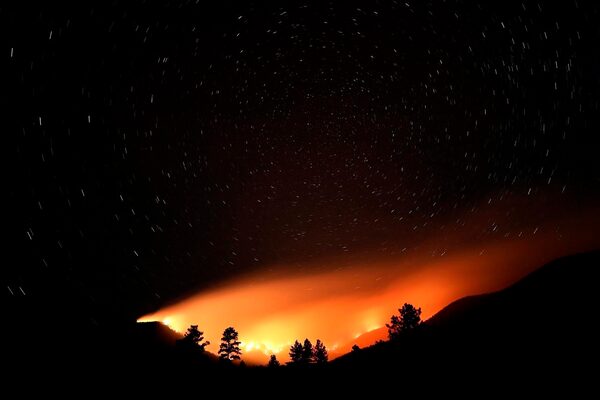
Light from hundreds of thousands of individual fires within the Museum fire create an ocean of light lapping at the slopes of the San Francisco Peaks as the fire burns in Flagstaff, Ariz.The Canadian Press
Anxious residents packed up prized possessions Tuesday as hundreds of firefighters worked to keep a wildfire in a forested Arizona city away from homes while they got help from the weather.
About two dozen homes have been evacuated in Flagstaff, a popular mountain getaway in the largest Ponderosa pine forest in the U.S.
No new evacuations were ordered but residents of 5,000 homes were previously told they might have to leave.
Gov. Doug Ducey declared a state of emergency, freeing $200,000 in state funding for the effort to battle the blaze in Coconino National Forest. The city and Coconino County issued emergency declarations a day earlier. The cost to date is $2.1-million, said incident Commander Rich Nieto.
People in Flagstaff peered through binoculars to get a closer look at the fire that sent plumes of smoke into the air and ash into yards. Helicopters buzzed overhead.
Kim Meehl stood in her driveway next to a field of freshly mowed dry grass. Her car and her husband’s truck were packed with photo albums dating to when she was a teenager and other precious items.
She had reserved the back of the car for dogs, cats and bunnies after taking goats to another pasture.
Crews battle major wildfire in Portugal, at least 32 people injured
Gaps in wildfire science leave Canadian researchers fighting blind against growing risks
Pikangikum First Nation evacuations on hold as forest fire gets smaller
“They’re hanging with us until we have to go,” she said. “I don’t know for sure, but I’m hoping, hoping, hoping. It looks better.”
Justina Ferrara and her grandmother readied for possible evacuation by gathering documents, photographs and treasured family heirlooms such as Kachina dolls and Native American blankets.
Ferrara was more worried about the mountain than her home.
“It’s the devastation to what’s going on in the vegetation,” she said. “It’s not going to come back anytime soon.”
Another wildfire was burning near a nuclear energy research site in Idaho, prompting the evacuation of non-essential employees mainly because of wind changes and smoke.
The fire had scorched about 132 square miles (341 square kilometres) of desert near the centre of the 890-square mile (2,306 kilometre) property, away from the buildings that make up Idaho National Laboratory.
In Arizona, fire crews said cooler weather, higher humidity and much-needed rain had worked in their favour, letting them intentionally burn areas on the north edge of the fire while hotspots cooled elsewhere.
Officials had feared erratic winds might shift the direction of the fire.
“If those winds kick up, that can cause real challenges for the firefighters,” fire information officer Steve Kliest said.
The storm sent water, ash and debris into communities below. Meteorologist Darren McCollum says the runoff was expected to be more intense because of the wildfire.
A federal team took over managing the fire late Monday, bringing more resources to fight the blaze and making it a priority regionally, Nieto said.
Officials estimated the fire had charred about 2 square miles (5.4 square kilometres) in a mountain pass that’s a prime spot for recreation within minutes of downtown Flagstaff. Aerial mapping was planned overnight to get a more precise measurement. Nieto said the fire was about 10 per cent contained.
The Federal Emergency Management Agency intends to reimburse the state up to 75 per cent of the money it spends on the fire, said Aaron Green of the Arizona Department of Forestry and Fire Management.
He estimated the cost to be $10-million, not all of which is paid by the state.
“Of course, that could increase dramatically if the fire goes into the community,” Green said.
The labyrinth of dirt trails in the Dry Lake Hills area attracts hikers, mountain bikers and horseback riders to sweeping views, groves of aspen and the sound of frogs croaking in shallow water.
“That’s where the good surf is, akin to that notion,” Kyle Hornbeck, a mountain biker who owns a bike shop in town.
Campfires outside designated areas have been banned at Dry Hills Lake since 2017 under special restrictions.
Officials say the fire was human-caused but they haven’t determined exactly what started it.
Lightning sparked more than a dozen wildfires across northern Nevada, with most in remote areas. No injuries or structure damage has been reported.
In southwestern Utah, a wildfire in dry grass destroyed a vacation home and a handful of outbuildings before being contained Monday.